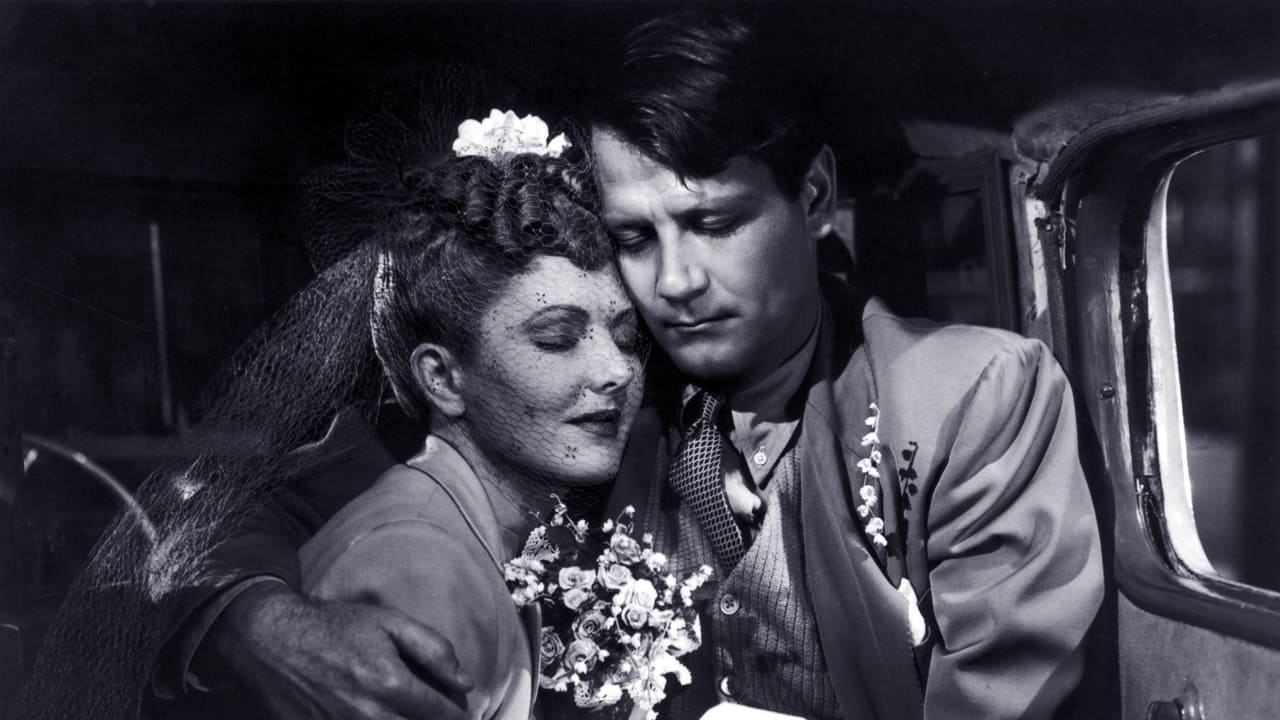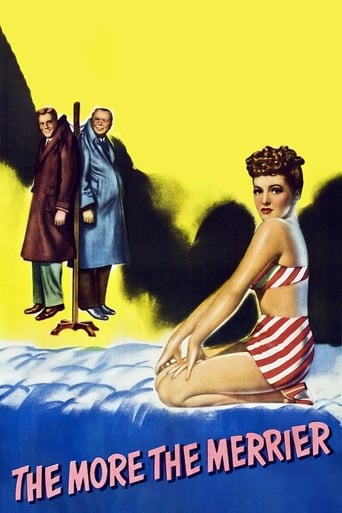

Another great screwball comedy starring the incomparable Jean Arthur. Charles Coburn is at his annoying best, too, and won a Supporting Actor Oscar for his trouble. If you like 1930s-1940s comedies, you'll LOVE this film!
... View MoreIt doesn't begin with much in the way of promise. Coburn has come to the crowded Washington, DC, in 1943, where real estate is at a premium. He bluffs his way into sharing the multi-bedroom apartment of Arthur, who is engaged to a rather dull bureaucrat who wears an obvious toupee. While she's at work, Coburn decides to invite Joel McCrae to join him in sharing the bedroom. Arthur returns, discovers what's happened, and tries to throw them both out. Too jammed up, you know. People bumping into one another and having trouble scheduling baths. It all sounds a little like a pilot for a failed television sitcom with a name like "Three's A Crowd." But it picks up interest as the plot takes its inevitable course. The foxy Coburn manages to get the engaged Arthur and the soon-to-leave-for-Africa Sergeant McCrae married. Was there ever any doubt? Three things save this gentle comedy from mediocrity. George Stevens' direction is just about flawless. He was later to go on to some splendid dramas, like "A Place In The Sun", and a superb Western, "Shane." But he had earlier handled comic material, like Laurel and Hardy shorts. And in 1943, a time when the typical comedy had turned frenzied, he's slowed things down considerably. Yes, there's a pratfall or two, and someone's trousers disappear out the window, but as the romance progresses the comedy becomes nuanced.I assume that it's the director who decided to break the fourth wall -- pretty innovative for the period unless you're Berthold Brecht or somebody. The audience is addressed directly (but wordlessly) twice. The first time, Arthur discovers that Coburn, on the other side of a paper thin wall, can be as clearly heard as if he were next to her in bed. She turns a stunned face to the camera and stares. Nice try, but no cigar. A bit later, the phonograph is playing a samba version of Cole Porter's "What Is This Thing Called Love." The rhythm is infectious. Arthur begins to sway to it in the kitchen. In the hallway, the pudgy Coburn listens for a moment then begins a few clumsy steps. On the climactic note, he turns directly to the camera, puts his fingers behind his ears, and does a little grind house bump. Bingo!Another thing that makes it a little different from others of its period genre is Joel McCrae's performance. McCrae had done a lot of light comedy before and was always convincing as the breezy, light-hearted, easy-going guy next door. Not here. He plays it rather glum and humorless, which makes his comic lines that much more effective. I don't think he ever laughs, and he only rarely smiles. Stevens gets a lot of mileage out of glances and stares and makes the most of what wit is in the script, which isn't too much.If you can get past the opening set up, you'll find a winning movie, full of quiet smiles and warmth. And, while hardly trying, and while studio bound, the movie evokes nostalgia for an earlier American life style when people felt wrapped up in a common enterprise and shared a common goal. Office walls display Liberty Bond posters or other patriotic iconography. On a Sunday afternoon, in the middle of summer, neighbors flock to the roof tops and lie in the sun, chatting, drinking soda, reading aloud the Dick Tracy comics in the newspaper. Much more was being shared than a two-bedroom apartment.
... View More"The More the Merrier" is co-written by four screenwriters, Richard Flournoy, Lewis R. Foster, Frank Ross, Robert Russell, and a surprisingly well-integrated screenplay effort, indeed. Jean Arthur is Connie Milligan, the centrifuge of attention; Joel McCrea is Joe Carter the unexpected distraction; and Charles Coburn is Benjamin Dingle, the ultimate Mr. Cupid connection. Miss A is comedienne Goddess alright: Connie is rigidly constrained but not exactly, wants everything according to her plan as expected, demanding adoration & affection at the same time, and capable of delivering very long sentences or speech unfalteringly without a grimace. She's one ball of spitfire, Miss Arthur - Hallelujah and Amen. Perfect casting to match Miss A's quick wit and skillful acting are tall, down-to-earth handsome Joel McCrea and cool, calm, but casual Charles Coburn. My fondness of this movie gem grew with each repeat viewing - appreciating all the nuanced moments evolved, sparked by the irresistible chemistry between Miss A and McCrea, and the endless humor and fun Coburn generates with his twinkling eye. Who would think the mundane subject of 'rent a room' can turn into such combustible drama! What a threesome to watch.The comedic tempo is at its prime impeccable timing as the circumstance on how Arthur's Connie discovers a third party when she came home unaware of McCrea's Joe being in the apartment, as he was simultaneously unaware that the place belongs to a woman landlord, as Coburn's Mr. Dingle did not mention such 'inconsequential' detail when he sublet his rented room to Joe. Adding to the amusing situation is the rhythmic music that anyone (yes, viewers included) would want to swing to anywhere: in the room waiting to use the bathroom, in the hallway just coming out of the bathroom, in the doorway 'hair-raisingly' watching the consequential moment to occur. Imagine the three in that scene - of course you have to see it to thoroughly marvel such flawless pacing at the superb ensemble performance of the trio and the ingenious direction of Stevens, with the deft artistry of editor and sound, cinematography, set decoration, costume and prop design, all inclusive. Joel McCrea swaying in his robe, bare-footed, is simply endearing to watch. Jean Arthur's face as she came out looking so surprised is precious to behold. She is a Goddess who can take any comedic riff and be comfortable with making fun of herself. Bravo! (Can't resist mentioning about the bit with Dingle's pants - truly a quiet hilarious 'Chaplin-est' sequence, indisputably so.) "The More the Merrier" (1943) is actually romantic to the core - the back and forth interplay between Arthur and McCrea is romance in poetry, and the bantering dialog is at once buoyantly merry and witty. Charles Coburn's nonchalant front while playing cupid on the sly is so easy to swallow whole, taking in along with his impish whims and humor. You can see Coburn in another film with Arthur, director Sam Wood's savory "The Devil and Miss Jones" (1941) where Coburn is in a front and center substantial role as an executive incognito - boss to Arthur without her awareness (again) - chaotic fun involving mistaken identity assumptions entangled. In a different subdued role in director Irving Cummings' returning soldier adjusting to family life 'dramady' "The Impatient Years" (1944), Coburn plays the discerning father to Arthur, providing sensible solution to her marriage woes.Yet another absolutely must see is director George Steven's "Talk of the Town" (1942) with the stellar ensemble of Cary Grant, Jean Arthur and Ronald Colman. (My user comments posted on IMDb on 20 April 1999 at "imdb.com/title/tt0035417/usercomments-1").
... View MoreThis old, wartime, mostly-forgotten-about little film is a real gem. In a genre that tends to rely on clichés and overused story lines, "The More the Merrier" clearly stands out. The acting, directing, and cinematography are all excellent. Arthur, McCrea and Coburn are all in top form and have a lot of meat to chew in this zany comedy-romance.The country is at war, and the nation's capitol is short on living space and long on eligible young ladies. Jean Arthur plays one such girl who wants to do her patriotic duty and lease half of her spacious apartment to some other young lady in need of a place to stay.That's great in theory, but when a jolly, resourceful, don't-blink-twice retired millionaire (played by Coburn) finds himself unable to secure a hotel room a couple days in advance of his reservation, Miss Milligan (Arthur) finds that he is a tough customer to dissuade. And when Dingle (Coburn) runs into a patriotic young man (McCrea) working on a secret wartime assignment and in need of a room...What follows is great comedy and an engaging romance. Arthur is absolutely radiant and spot on with her expressions and lines in what may be her best film (with many other notables including Mr. Smith Goes to Washington, Easy Living, and Shane to name a few). Coburn gets a wonderful part and makes the most of it, making him a joy to watch. McCrea fills in any remaining gap with another solid performance and good material to work with.Aside from the story and the actors, the cinematography, direction and a carefully planned set combines to form a couple unforgettable scenes between Arthur and McCrea. In the apartment, the two bedrooms face the outside wall and are separated by a thin, uninsulated wall. In the first remarkable scene, we experience the intimacy of these two characters as they converse through this wall, with the cleverly designed shot making it almost appear as if the two are in the same bed (quite remarkable for its time with the Production Code solidly in place).The second scene is one I will not describe, but is cleverly executed and makes for the perfect ending to this slick little film. The memory of this movie sticks in your mind, and it is a pleasant memory indeed. Seldom if ever have romantic comedies been this funny, well acted, and sweet. The More the Merrier stands on the very top rung of its genre. Highly recommended.
... View More